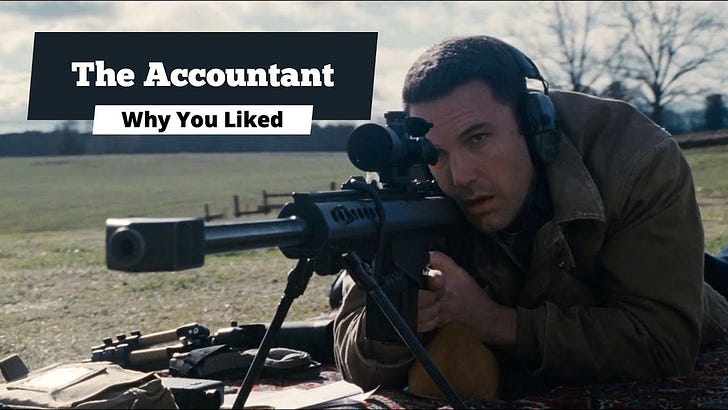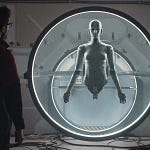Hollywood loves a genius, but only if they look the part. What happens when brilliance comes with boundaries and the execs aren’t ready for that kind of hero?
Well, we’re in luck. The madlads over at Warner green-lit one of the best stories of heroism we’ve seen in decades. With the sequel now out in the wild, it’s time to revisit the best bad boy in taxation.
We’ve had charming spies, tortured vigilantes, and billionaires in batsuits as heroes, but we’ve never had an autistic accountant with both a kill count and a moral code.
2016’s The Accountant gives us Ben Affleck as the titular accountant Christian Wolff: a pocket-protector-wearing tax accountant helping out the little guy. Christian runs a small-time accountancy; his clients are everyman farmers, small business owners, and the odd cartel.
Wait, what?
The story really kicks off when a plot collision hits us. John Lithgow’s Lamar Blackburn hires Wolff to dig into some shady shit in his company, while J.K. Simmons’ Ray King and Cynthia Addai-Robinson’s Marybeth Medina hunt down the mob. If you’re wondering what mild-mannered Blackburn has in common with a Colombian drug cartel, well, you’ll have to watch the movie, and every moment of it is worth your time.
Still. I can hear you ask, “But Richard: an accountant?!”
Unique Heroism
A 2025 report found that about 19% of Americans identify as neurodivergent across conditions like autism spectrum disorder, ADHD, and dyslexia. About one in five of us has neurodivergent traits, even if you present as “normal.” That’s not fringe; it’s mainstream while society presses the mute button.
Christian’s story resonates so strongly with us because we can see ourselves in him. Labelists might call him a high-functioning autistic, but his own father thought he was trouble. Dad’s military-strict upbringing highlights the gulf between what neurodivergants need to thrive and what even loved ones provide.
However, Old Man Wolff also gave Christian a unique set of skills. Besides instilling in his son a desire for justice, he also taught Christian how to fuck up another man with nothing more than a wet sponge. Military training did the rest, disgorging a man onto the criminal underworld who knew every spot that could feel pain, and had a forthright desire to see justice served.
And serve it he did, acting as a chartered accountant for some of the worst scum and villainy out there. This is the movie’s first real trick: autism is presented as a strength. Christian’s meticulous, fact-based thinking makes him a very effective hero. It’s a refreshing, powerful narrative where an autistic man’s differences drive a perspective on problem-solving that “normals” would miss.
Evolution as Revolution
A few years back, I had the great fortune to see speaker James Whittaker give a talk. Paraphrasing poorly, one of his presentation’s load-bearing pillars was how the rise in neurodivergence may just be evolution at work: an adaptation for the technology-rich world we’ve arrived in.
He’s not putting forward the thesis that evolution moves at light speed, but rather that adaptation occurs all the time, and often we just need the right lens to see it as a strength.
Around the same epoch, I read Blindsight by Peter Watts. Among his cast of amazing characters, Watts showcases Susan James, AKA The Gang of Four. James is a multicore person; in our time we’d toss her in the bin as a split personality disorder, but in Watts’ visionary work, she’s a talented linguist, an MCC (or, Multi-Core Complex). In Blindsight, Split personality is a powerful force to allow the brain to literally do multiple things at once, lending Susan the ability to do things at a higher rate than anyone else on the crew.
Christian is our action-ready personification of the idea of evolution as an advantage. His autism gives focus, not inhibition. His skills with numbers and the breadth of his thought allow him to see patterns only machines with teams of data scientists can aspire to. And his detail-driven nature ensures any task he starts, whether it’s working out where that missing million went, or how to hit the bullseye on a target at two klicks out, is done better than anyone else.
What we initially take as a disadvantage blooms into admiration. As we watch The Accountant, not only do we gain understanding of neurodivergence, but an idea forms: wouldn’t it be cool if we were a little more like Christian Wolff?
The World Is Loud
So far we’ve talked about what a badass Christian Wolff is, but we need to spend a little time on how bad the world is to him. In The Accountant, Christian kills an astonishing number of truly bad people, a Wick-worthy kill count only seen in ranked Call of Duty.
However, as the old saying goes: you can’t get to heaven without dying first. Christian’s life is full of sensory data he struggles to process. He doesn’t understand emotions well. Doesn’t do sarcasm. Can’t look people in the eye or tell them how he feels. Discordance is a nail driven right into his brain, and anything out of order trips a switch in his mind that makes it hard to just walk away.
The disordered nature of existence is a constant burden. A heavy load he can never put down, for all his skills in dealing with the impossible.
This hits with such punch because Christian Wolff star Ben Affleck and director Gavin O’Connor were committed to accurately depicting autism. They did the research: consulting with specialists, educators, and individuals on the spectrum. Affleck was apparently intrigued by the opportunity to subvert the typical action-hero narrative, and wanted to highlight the strengths and complexities of individuals on the autism spectrum. Reading some of his interviews made me remember this piece from Castle’s season-three finale episode:
What if your mind works so differently that no one lets you speak at all? Affleck’s phenomenal performance turns that silence into a weapon. By being the person we find uncomfortable to talk to, he slices through rivers of bullshit on his quest to solve the hardest of problems: the dilemma of humanity.
The Body Reflects the Mind
A real challenge we all face in life is understanding who the real villains are. Sometimes the most powerful need only look in the mirror, but for the rest of us, it’s a more complicated problem.
Part of the morass of us is social engineering. We know nice people smile. They can be friendly, make jokes, and laugh along. They’ll make eye contact when telling the truth and ensure we feel good about being in the room with them. And you know, one of the problems of being autistic is missing out on those, what we’d call, social cues.
It’s how Christian Wolff is essentially the world’s best evil detector.
In The Accountant, he doesn’t care what you say, only what you do and what the evidence shows. He finds the villain at the heart of the plot by being diligent, faithful, and true to his nature. It’s something many of us might wish we could do: know when someone’s lying to our face versus being truthful.
This gift doesn’t come without a cost. Throughout the movie’s runtime, a two-hour-and-eight-minute serenade to justice, Christian has a bad time. We know his body is beaten and bruised, but this is a clever trick writer Bill Dubuque uses to parallel the assault on his mind. His physical struggles mirror his emotional journey. He wants to finish the job of finding the error and fixing it.
He’s aided in his quest by Anna Kendrick’s Dana Cummings, an immensely likeable accountant-next-door co-star. And Christian definitely likes Dana; she’s an aspiring mathlete, a diligent worker who found the original error he is tasked to correct. Dana, for her part, finds Christian weird as hell, but her bumbling awkwardness in their first interactions is totally lost on Christian. He only sees someone who is good and kind.
It’s through this shared view of humanity—that there are good and bad people, sure, but also cool maths problems to solve—that they join forces to uncover the Big Bad. Christian’s straightforward thinking lets him see the true nature of the villains, and Dana’s straightforward thinking lets her see the true nature of Christian.
The Batman of Bookkeeping
Behind the Ledger: Ben Affleck’s Craft
We know Ben Affleck does a mean Batman, but how’s he as an accountant?
It turns out: very good.
We’ve talked about one in five people identifying as neurodivergent already, covering a wide range of conditions. We haven’t talked about CDC numbers on autism specifically. It turns out the rate of autism in children has increased from 1 in 36 to 1 in 31. The first survey, done 22 years ago, had the rate at 1 in 150. That is a tremendous jump in childhood-autism rate.
It’s no wonder people are worried, and it’s no wonder people want to see heroism in a condition affecting so many children. It turns out Ben Affleck was exactly the right man to play this role.
While many Accountant fans might relate to Christian’s experiences, it’s only because Affleck’s performance makes them so real and present. From the tiny details of how he puts food on his plate to the precision of parking his car, Affleck instils every scene with a believable aesthetic that says, “This is what it’s like.”
He doesn’t gloss over the hard parts. He doesn’t try to trivialise the problems autistic people have. But he also presents an alternative view, one based on courage and strength rather than fear of the unknown: that people with autism can be powerful.
His story is about embracing differences and finding strength in them. Affleck gives voice to people who are rarely allowed to be the main character. He doesn’t tear anyone down or marginalise those who have trouble being heard; Affleck’s role is a megaphone. The emotional climax of The Accountant is a gesture: this is what’s real for Christian Wolff. This is how he speaks.
And this is how he gets the fucking job done.
A World of Silent Heroes
By putting Christian at the centre of the movie rather than simply relying on the absurdly good action, The Accountant flips the script. It isn’t a story about autism. It’s a story through it.
Whether by design or by resonance, Affleck’s portrayal speaks to, and for, people who don’t fit the usual mould. The Accountant isn’t just a good action film. It’s a statement. In a world that too often silences difference, this film lets it speak—and speak loud.
Like Montgomery said: we owe them that.
What did you think of The Accountant? Pull a pen from your pocket protector and let me know in the comments below. If you liked this, consider doing the maths and subscribing, and maybe take the bold problem-solving step of hitting the like button.
Thanks for reading!
📬 Like this kind of overthinking?
Subscribe to Roll for Narrative for more deep dives into the stories that actually say something (whether it’s movies, games, or books that… know how to leave a bruise).
I break down the heroes who don’t fit the mould, the villains we secretly agree with, and the narrative gut-punches we still haven’t recovered from. Occasionally with maths. Sometimes with swords. Always with feeling.












